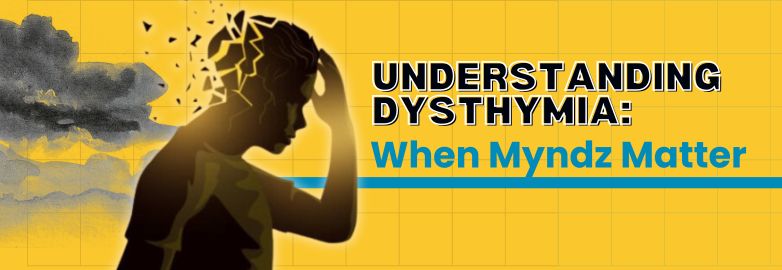Understanding Dysthymia: When Myndz Matter
September 11, 2023

Mental health is a topic that has gained much-deserved attention in recent years, and for good reason. Conditions like depression, anxiety, and bipolar disorder have become more recognized and discussed, leading to better understanding and treatment. However, there are still lesser-known mental health conditions that deserve our attention, one of which is dysthymia.
In this comprehensive blog, we will delve deep into dysthymia, exploring its definition, symptoms, causes, and treatment options. We’ll also emphasize the importance of recognizing and addressing mental health concerns with the help of professionals and organizations like Myndz Matter.
What is Dysthymia?
Dysthymia, often referred to as Persistent Depressive Disorder (PDD), is a chronic form of depression that lasts for at least two years or more in adults and one year or more in children and adolescents. While it may not be as severe as major depressive disorder, dysthymia can significantly impact one’s quality of life.
Symptoms of Dysthymia
Dysthymia is characterized by a persistent low mood and a range of other symptoms, which may include:
1. Feelings of hopelessness
2. Loss of interest in previously enjoyed activities
3. Low energy or fatigue
4. Changes in appetite or weight
5. Difficulty concentrating or making decisions
6. Feelings of inadequacy or low self-esteem
7. Sleep disturbances (insomnia or excessive sleep)
8. Isolation and social withdrawal
9. Physical symptoms such as headaches or digestive problems
It’s important to note that these symptoms often persist for an extended period, leading individuals to believe that this is just “how life is” for them. However, it’s crucial to recognize that these feelings can be indicative of dysthymia and should not be ignored.
What Causes Dysthymia?
The exact cause of dysthymia isn’t well-understood, but like many mental health conditions, it likely results from a combination of factors, including:
1. Brain Chemistry: Imbalances in neurotransmitters, the brain’s chemical messengers, may play a role in dysthymia.
2. Genetics: A family history of depression or dysthymia can increase one’s risk of developing the condition.
3. Environmental Factors: Childhood trauma, chronic stress, and significant life changes can contribute to the development of dysthymia.
4. Personality Traits: Certain personality traits, such as being prone to negativity or pessimism, may increase susceptibility.
Dysthymia Diagnosis and Treatment
Diagnosing dysthymia can be challenging because its symptoms often overlap with those of major depressive disorder. However, mental health professionals use various assessment tools, interviews, and discussions to make an accurate diagnosis. If you or someone you know is experiencing symptoms of dysthymia, seeking professional help is crucial.
Treatment:
The good news is that dysthymia is treatable, and there are several effective approaches, including:
1. Psychotherapy: Talk therapy, such as cognitive-behavioral therapy (CBT) and interpersonal therapy, can help individuals recognize and change negative thought patterns and behaviors.
2. Medication: In some cases, antidepressant medications may be prescribed to help regulate mood.
3. Lifestyle Changes: Incorporating regular exercise, a balanced diet, and stress management techniques can have a positive impact on mood.
4. Support Groups: Joining support groups or seeking support from friends and family can provide emotional assistance and a sense of belonging.
5. Mindfulness and Meditation: Practicing mindfulness and meditation techniques can help manage symptoms and promote emotional well-being.
It’s important to remember that treatment should be tailored to the individual, and a mental health professional can help determine the most suitable approach.
The Role of Myndz Matter
Myndz Matter play a pivotal role in raising awareness about mental health conditions like dysthymia. They offer a platform for individuals to seek information, connect with others facing similar challenges, and access resources for support and treatment.
Myndz Matter emphasizes the importance of destigmatizing mental health and seeking help when needed. They offer a range of services and resources, including:
1. Educational Content:Myndz Matter provides informative articles, blogs, and resources to help individuals better understand mental health conditions.
2. Supportive Community: They foster a sense of community and understanding by bringing people together who have experienced or are currently dealing with mental health challenges.
3. Access to Professionals: Myndz Matter can connect individuals with mental health professionals who can provide guidance, therapy, and treatment options.
Dysthymia, though often overlooked, is a significant mental health condition that can have a profound impact on one’s life. Recognizing the symptoms, seeking professional help, and accessing the support and resources provided by organizations like Myndz Matter are crucial steps toward managing and overcoming this chronic form of depression.
Remember, mental health matters, and seeking help is a sign of strength, not weakness. Let’s work together to create a more compassionate and understanding society where Myndz Matter, and everyone’s well-being is a priority. If you or someone you know is struggling with dysthymia or any other mental health condition, reach out to Myndz Matter today. Let’s make a difference in the lives of those who need support. Your journey to mental well-being begins now.
